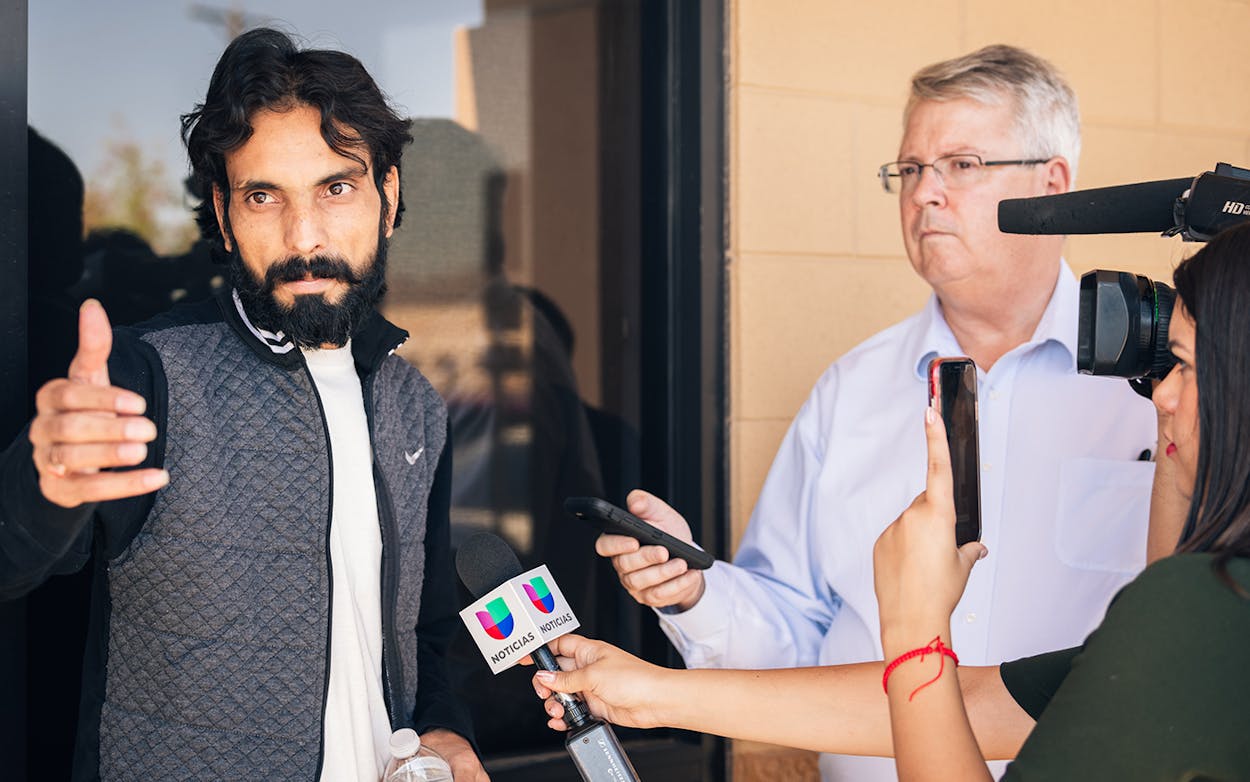Two weeks after an El Paso federal judge criticized Immigration and Customs Enforcement over the agency’s treatment of Indian men hunger-striking for their freedom, one of the asylum seekers has been released. On Thursday, 33-year-old Ajay Kumar walked out of an ICE detention center greeted by a small group of supporters. After more than a year in ICE custody and 76 days of refusing to eat, Kumar weighed just 107 pounds.
“I’m feeling very good, sir, because I’ve got my freedom and I’ve waited a long time for this,” Kumar said in an interview minutes after his release.
Kumar and five other Indian men began a hunger strike on July 9 to demand that they be set free while judges considered their asylum claims. Kumar and two others were eventually fed through a nasogastric tube by ICE for more than three weeks in August and September. They have described the force-feeding as painful and humiliating, but pledged to keep refusing food until they were freed, or died. Finally, on September 18, the ICE doctor overseeing their force-feeding, Dr. Michelle Iglesias, told Kumar and another man, Gurjant Singh, that she would sign their release papers if they resumed eating, their lawyers said Thursday. After getting written promises from ICE officials, they resumed eating on September 21.

ICE has declined to answer any questions about its handling of the hunger strikers, so it’s unclear why the agency decided to free Kumar and Singh after weeks of rebuffing their demands. (Singh is expected to be released this week; he weighs 89 pounds. The other hunger striker who was force-fed was deported earlier this month while still on his hunger strike.)
In a court order on September 12 that upheld the legality of ICE force-feeding, U.S. district judge Frank Montalvo criticized ICE for providing Kumar with poor medical treatment.
“It is the duty of the government to provide adequate medical care, not just to keep [Kumar] alive,” Montalvo wrote.
Montalvo said that in the future, ICE should have hunger strikers checked by independent physicians before the agency seeks a force-feeding order from a federal judge. Montalvo’s criticism was based in part on an assessment from Dr. Parveen Parmar, a professor at the Keck School of Medicine at the University of Southern California, who reviewed Kumar’s medical records at the request of his attorneys.
Citing inappropriate attention to low blood pressure and infrequent visits by Iglesias while Kumar was under her care, Parmar said Kumar’s treatment was “the worst medical care I have seen in my ten years of practice.” Montalvo noted in his ruling that ICE did not dispute any of Parmar’s findings in its written response to the court.
Parmar reviewed Kumar’s medical records again last week after he was temporarily transferred from ICE’s El Paso Processing Center to a private acute long-term care facility in El Paso.
She said he was at risk of death or permanent disability. “His weight was extremely low and there are signs that his body may have suffered damage resulting from his hunger strike,” Parmar told Texas Monthly.
In the interview, Parmar blasted Kumar’s medical care.
“One, every professional society that has ever spoken on this issue has stated, clearly, that force-feeding is unethical. Second, my review of all of Mr. Kumar’s care in ICE custody showed a consistent lack of adherence to a basic standard of care which was so shocking, it has haunted me since,” she said.
ICE has obtained force-feeding orders for a total of thirteen hunger strikers in El Paso this year, a legal process that has been shrouded in secrecy. Lawyers for the detainees weren’t given an opportunity to object to the orders, and all of the cases have been sealed, at least initially, from the public. Montalvo agreed to unseal most of Kumar’s file at the request of his lawyers, Lynn Coyle and Chris Benoit.
Benoit urged judges to require that detainees get notice that the government is requesting a force-feeding order, so they can get an attorney and object, should they so choose. “There is also no reason for these proceedings to be handled completely under seal,” he said.
The six hunger strikers this summer are the second group of Indians to undertake such a dramatic protest. In February and March, nine men from India were force-fed at the El Paso facility for two weeks. Seven resumed eating after their force-feedings; the two who did not were eventually released in April.
Kumar will now live with Margaret Brown Vega and Nathan Craig of Las Cruces, New Mexico, who are serving as his sponsors. Along with an ankle monitor, they’ll ensure he makes his court hearings and provide him support as he tries to convince the immigration system that he will face persecution if returned to India. An immigration judge has denied his asylum request, but Kumar is appealing.
“I got my freedom. Freedom is very good for everyone, and me also,” Kumar said.
- More About:
- El Paso






